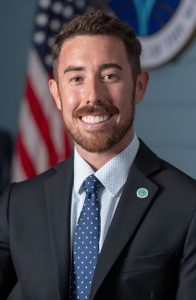At the recent 10th Annual Southeast Florida Regional Climate Leadership Summit, I was, like many others in the audience, on the edge of my seat for the Business Case for Resilience, a panel discussion between the leaders of our region’s business organizations.
Full disclosure: I have long been a critic of anti-democratic corporatism, an opponent of Wall Street’s increasing profit from — and influence over — our institutions, and was a protester and organizer with Occupy Wall Street in New York City. However, I am not an anti-capitalist. I am a proud small business owner.
I wholeheartedly agree with The Palm Beach Editorial Board’s position in their October 23 editorial (Editorial Exclusive: Region’s business leaders must step up, take action on sea level rise). The regional business leadership community’s effort to organize around the threats of sea level rise is indeed a welcome start. But you can’t win the race if you start and then simply wait for the finish line to come to you.

Dennis Grady, president and CEO of the Chamber of Commerce of the Palm Beaches, said that if we don’t put resiliency, climate, and the environment at the top of our priority list, it will negatively impact our major industries in Florida.
Alfred Sanchez, president and CEO of the Greater Miami Chamber of Commerce, echoed Grady, saying that the business community was beginning to see environmental protections and climate resiliency in terms they understand: necessary investments for the future of business.
The logic is this: not only would resiliency allow business to continue into the future, it would create jobs. Construction, engineering and design firms will make profits. Win-win.
But, as I asked panelists, what about the investment itself? It isn’t enough, I argued, to simply support climate resiliency by profiting off of projects. If climate resiliency is indeed an investment in the future of business, as they admit, then we need to start talking frankly and openly about the investment. The hard cash dollars, I mean. Who is paying, and who isn’t?
Corporatist lobbyists have successfully won sweeping tax cuts for corporations and the wealthiest Americans, compromising our ability to invest. Our strained county and municipal budgets can’t foot the bill alone. Who is paying, and who isn’t?
If business leaders now recognize the need for investment in climate resiliency in Florida, isn’t it fair to ask wealthy corporations to contribute to that investment? Isn’t that truly what investing is, paying in now for returns in the future?
The recent U.N. IPCC report issues a dire warning: either we quickly and significantly alter our behavior on this planet and limit greenhouse gas emissions, or we imperil the future of human civilization on Earth as we know it today.
We are all starting to come to the table; this is a welcome start. Now we all must start chipping in, sharing in our investment in the future. A panelist at the summit admitted, “We pay now, or we pay later.” Trouble is, if we don’t pay now, there may not be a later.
Mike Meier is a Stuart Ciity Commissioner.
“The Invading Sea” is a collaboration of four South Florida media organizations — the South Florida Sun Sentinel, Miami Herald, Palm Beach Post and WLRN Public Media.



